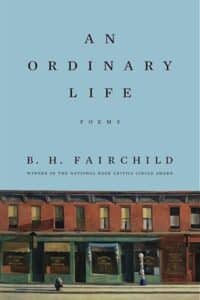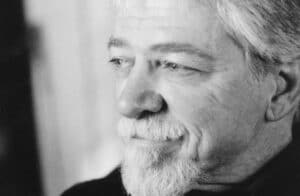Poet B.H. Fairchild finds solace in the ordinary
I can’t imagine the grief of losing a child, and I hope I never experience it. In our minds, at least, and in our cultures, the death of a child violates the natural order of things. My grandmother never spoke much about it, nor my father, but I would hear occasional murmurs about Eloise, the daughter and sister who died at age 2 in 1915. My father would have been her little brother, so he never actually knew her. My grandmother mourned her child the rest of her life; it was a quiet, intensely personal mourning.
It was that kind of quiet mourning that I found when reading An Ordinary Life: Poems by B.H. Fairchild. He experienced the grief from loss of a child when his son Paul died at age 46 in 2017. It’s not the same as losing a young child or an infant, because now an almost full lifetime of experience and memory is packed into the death. And there are a daughter-in-law and grandchildren to be considered.
Fairchild did what writers often do when facing a tragedy. He wrote about it, not immediately but over a period of years. The writing follows the grief — the initial impact and then the lingering over years. In my grandmother’s experience, the edges of grief might have softened over the decades, but it never went away. It never really goes away; it becomes part of who you are.
A poem included in this collection and previously published in Sewanee Review in 2020 is “On the Sorrow God Pours into the Little Boat of Life.” It’s a moving description of how grief, and the loss it springs from, can unexpectedly smack you in the head, and in the heart. The poem describes standing at a record store, listening to Diana Ross and the Supremes, when the narrator realizes his son has died and finds himself on his knees, a young woman trying to help him up. The first poem in the collection, it sets the stage for what follows.
The poems don’t dwell on death. They nestle into the ordinary, into memory and family history and odd things you recall your mother or father once said. And you understand that this is the expression of grief, too — searching what you know to try to understand what you can’t know. For Fairchild, that takes the forms of a meditation on Black Friday, a schoolboy romance, an elderly woman on her deathbed asking for a map, the story of your mother in a blizzard, a hotel room number written in Braille, your parents listening and dancing to Benny Goodman, and even that aunt who loved wearing her fox fur, head included.
At a Meeting of Scholars I Think of Aunt Bea

wreathe the room
like fox heads around
my Aunt Bea’s neck
in 1947.
Fox fur was big then.
So were Packards,
big bouncy boats
(ours was emerald green)
swaggering through Houston streets,
manned by fashionable dames
in fox-fur stoles.
And I sat swallowed
in the back seat, Packard
purring, fur heads flying.
She said, “Their eyes are fake!
They came from Marshall Fields,
half-price in ’38!”
I didn’t care.
Deaf to dates and names,
oblivious to year and make,
I only thought of foxes
and how they lived
and what they are.

An Ordinary Life may be about the everyday, but it’s also a poignant reminder. The ordinary and everyday stuff of life is more important than we realize. It can often be, and usually is, a source of solace in the face of tragedy and loss.
Photo by James Jordan, Creative Commons, via Flickr. Post by Glynn Young.
How to Read a Poem uses images like the mouse, the hive, the switch (from the Billy Collins poem)—to guide readers into new ways of understanding poems. Anthology included.
“I require all our incoming poetry students—in the MFA I direct—to buy and read this book.”
—Jeanetta Calhoun Mish
- Poets and Poems: Sandra Marchetti and “Diorama” - April 24, 2025
- Poets and Poems: Christina Cook and “Roaming the Labyrinth” - April 22, 2025
- Longfellow’s “Paul Revere’s Ride”: Creating a National Legend - April 17, 2025


Laura Lynn Brown says
Lovely post, Glynn. And thanks for these two poems — both stunners in their own way.